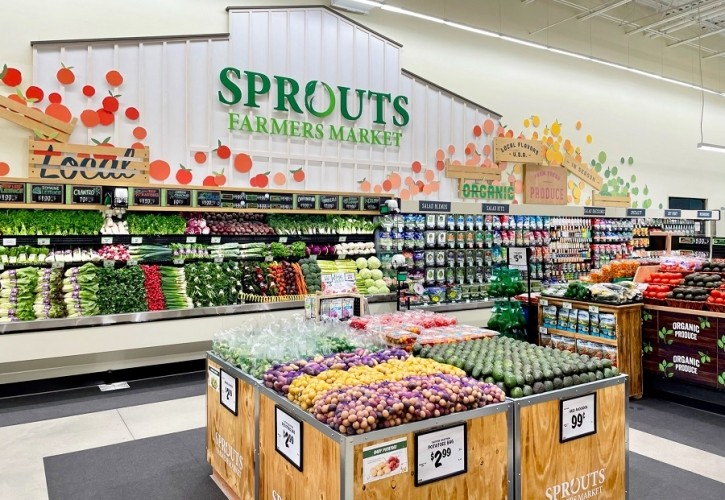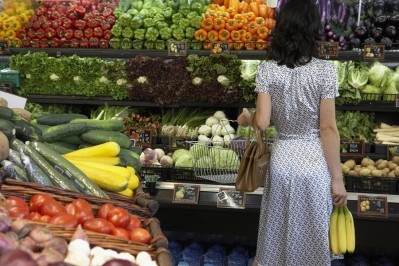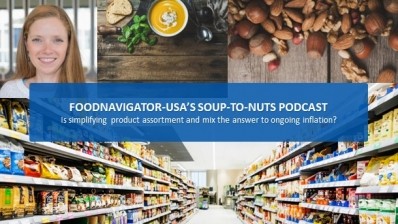Sprouts Farmers Market sales buoyed by emerging brands' appeal to economically-resilient health-conscious consumers

The retailer reported a year-over-year 12% increase in net sales to $1.9 billion, with comparable store sales growth of 6.7%, resulting in a notable step-up in its diluted earnings per share from 65 cents to 94 cents and adjusted diluted EPS of 71 cents in its second quarter ending June 30.
The “outstanding second quarter results” are “a direct outcome of consistently executing and evolving our long-term strategy over the past few years,” CEO Jack Sinclair told investors and analysts on Monday evening after the bell.
In mid-2019, Sprouts made a then-controversial decision to discontinue “aggressive, ever-increasing promotions” that drove traffic but eroded margins and brand equity, in favor of better-catering to the bulk of the retailer’s consumers who were drawn to the treasure-hunting experience and broad selection of health-conscious and diet-specific products it offered, which were harder to find elsewhere.
While this strategy initially caused Sprouts Farmers Market’s sales and traffic to fall, this quarter suggests it is paying off in the long-term as more consumers embrace a healthier lifestyle and are drawn to the retailer’s growing selection of unique products sourced from up-and-coming and recently launched startups.
“Our health enthusiast target customers continue to respond positively to our differentiated product assortment and unique shopping experience. As consumer preferences shift towards healthier living, we anticipate there will be even more health enthusiasts in the future than there are today, bolstering our confidence in the long-term potential of Sprouts,” Sinclair said.
“The thing we have always said is that the nature of our assortment, whether it is attribute-based, whether it be keto or paleo or vegan or vegetarian or dairy or non-dairy or plant-based, all those trends, if you get into that space and your food purchase you can tend to stick with it almost irrespective of what the broader economic circumstances around you are. And I think that is what has given us a little bit of a moat here in terms of our customer base and their dietary needs and their dietary requirements,” he added. “More and more we are seeing that our customers are resilient to the external environment that is going on around them.”
This is in contrast to many lower-income shoppers, who continue to struggle with inflation are buying less and on promotion more – much to the determinant of retailers and brands that cater directly to them.
Sprouts’ foraging team draws consumers, startups to stores more often
Existing consumers not only are spending more at Sprouts, but the retailer reports they are visiting more often, which Sinclair attributes to the retailers’ unique selection and broad range of more than 200 new items released through the second quarter and sourced by its “foraging team.”
He explained: “Our foraging team continues to drive unique assortment through both Sprouts brand and emerging brands in our in-store Innovation Center. Sales continue to grow in this space, and we have a strong process to bring the best products quickly to our shelves.”
The retailer launched its foraging team several years ago with the primary directive of finding products that are not sold anywhere else and which feature key attributes that health-conscious consumers want, including “appropriate ingredients, no additives, none of the bad stuff … and a lot of positive ingredients,” Sinclair said.
Word of the retailer’s efforts is getting out among startups as well, with entrepreneurs bringing more products to the foraging team than the store can stock, he added.
“We have become a bit of a go-to place for people to bring products to the market,” he said.
He explained that Sprouts is “very comfortable being the kind of beta-test for these kinds of products,” about 25% of which “move over quite quickly into the main fixtures.” He added, many products from emerging brands eventually "disappear from our business in a few years down the line as new products come behind it” and they have the proven track record they need to enter other retailers.
He continued: “We are very much encouraging this entrepreneurial industry to see Sprouts as the destination for this product.”
Sprouts launches loyalty program
To build on this momentum, Sprouts launched this month a loyalty program in Tucson, Ariz., and Nashville, Tenn., to better understand what “excites and engages our customers while increasing their share of wallet with Sprouts,” Sinclair said.
“The key is to get data from customers. When you are a specialist kind of retailer like we are, and a targeted retailer with a limited customer base, we have to understand that a personal level, much more information and getting that data is the key to the work going forward. And then we will be able to create this feeling of specialty amongst our customers,” he explained.
Before launching, Sinclair added, the retailer spent “a lot of time trying to get this right,” including “a lot of work behind the scenes to make sure the technology behind it works effectively and the customer experience is seamless.”
While the program has only been up and running a few days in two markets, Sinclair said he is encouraged by how well it is working and eager to expand the program to new markets and consumers.
‘Significant work ahead’
While Sinclair acknowledged that the second quarter yielded “exceptional results,” he also noted that the retailer faces “significant work ahead,” against which he said he is confident the team will deliver.
As such, the company expects total sales growth for the full year between 9% and 10% and comp sales in the range of 4% to 5% -- bolstered in part by plans to open about 35 new stores, most of which will occur in the fourth quarter.










